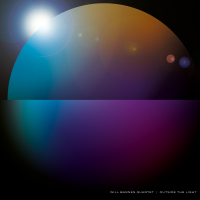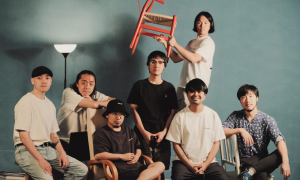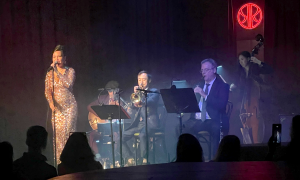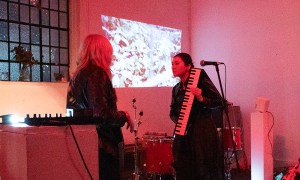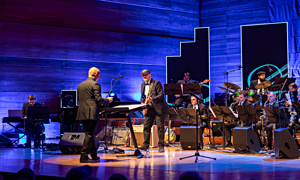Home » Jazz Articles » Live Review » Cindy Blackman: Changing Jazz
Cindy Blackman: Changing Jazz
Cindy Blackman
The Bach Dancing & Dynamite Society
Half Moon Bay, California
December 7, 2008
Jazz has been in cycles of change almost from its inception, and I see another of those changes happening now. Jazz drummer Cindy Blackman's recent performance at the Bach is a prime example of this change. Some writers refer to her style as post-bop but that's too nebulous a term to distinguish it from other modern jazz forms. Let's tell it like it is: Blackman's style is power-jazz.
From the moment that she sat down before her trap set, Blackman launched into the first tune with a surge of energy that engulfed the house with a fiery passion that is hard to find in most jazz drummers. Because there was no introduction, no naming of the tunes, Blackman slid from one piece to the next with hardly a break. Her drumming was crisp, dynamic, and delightfully edgy. She dominated the first cut that almost became a drum solo.

By the third piece, Blackman gracefully took the backseat and let her band have the limelight for a few moments. Carlton Holmes split his time between his Fender Rhodes and the house Steinway Baby Grand, while Antoine Roney, tenor sax, came through with riffs that reminded me of a mix between the soul of Coltrane and a laid back Kidd Jordon. Behind them was George Mitchell on upright bass holding the groove solidly in place but letting it breathe.
By the end of the first set, it was obvious that Blackman's drums were the principle instrument. During the break someone asked, "Aren't the drums supposed to support the other instruments and just keep time?" That's the way it tends to be, but here's where power-jazz defines itself: drums become the lead instrument of the band and the other instruments most often support the drummer as a working unit, together. Blackman directed the group with vivid hues, shifting tempos, and thoughtful dynamics. She never merely kept time but played the rhythms within it.
This could, with some drummers, become a problem because drums can overwhelm all of the other instruments involved unless the band is well rehearsed and of a professional caliber. The Cindy Blackman Quartet was certainly in the groove with each other. The balance between sax, keyboards, and bass came through extraordinarily well no matter how passionately or dynamically Blackman played.
After the audience's standing ovation, I met with Ms. Blackman and asked her what the difference was between playing such an intimate room as the Bach and other rooms she'd played on her tour. She said, "In such a close environment the band can feel the nuances of the audience and that influences how they play. We can more easily tell that the audience is listening and enjoying the band." She added, "And we could tell that this was a sophisticated audience."
"Cindy has been touted as 'One of the hottest drummers in the business by the Star-Gazette, and is regarded as one of the top drummers in the world.'"—All About Jazz—New York. As it turned out, Blackman lived up to her reputation, and delighted the appreciative audience. And that's what power-jazz is all about.
Tags
PREVIOUS / NEXT
Support All About Jazz
 All About Jazz has been a pillar of jazz since 1995, championing it as an art form and, more importantly, supporting the musicians who make it. Our enduring commitment has made "AAJ" one of the most culturally important websites of its kind, read by hundreds of thousands of fans, musicians and industry figures every month.
All About Jazz has been a pillar of jazz since 1995, championing it as an art form and, more importantly, supporting the musicians who make it. Our enduring commitment has made "AAJ" one of the most culturally important websites of its kind, read by hundreds of thousands of fans, musicians and industry figures every month.








